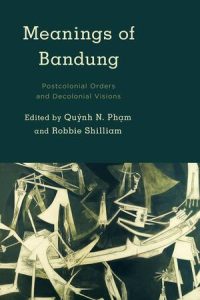Meanings of Bandung: Postcolonial Orders and Decolonial Visions

Editor: Quỳnh N. Phạm and Robbie Shilliam
Publisher: Rowman & Littlefield International
Year of Publication: 2016
Print Length: 256 pages
Genre: Non-Fiction / International Relations
Topic: Asia-Africa Bandung Conference, Non-Aligned Movement, Colonialism & Post-Colonialism, Decolonization & Anti-Colonization, Internationalism, History, Independence & Liberation, Politics & Power, Solidarity
The Bandung Conference was the seminal event of the twentieth century that announced, envisaged and mobilized for the prospect of a decolonial global order. It was the first meeting of Asian and African states, most of which were newly independent, to promote Afro-Asian economic and cultural cooperation and to oppose colonialism or neocolonialism by any nation.This book focuses on Bandung not only as a political and institutional platform, but also as a cultural and spiritual moment, in which formerly colonized peoples came together as global subjects who, with multiple entanglements and aspirations, co-imagined and deliberated on a just settlement to the colonial global order. It conceives of Bandung not just as a concrete political moment but also as an affective touchstone for inquiring into the meaning of the decolonial project more generally. In sum, the book attends to what remains woefully under-studied: Bandung as the enunciation of a different globalism, an alternative web of relationships across multiple borders, and an-other archive of sensibilities, desires as well as fears.
Table of Contents
INTRODUCTION:
Revisiting Bandung
1. PART I: SENSING BANDUNG
The Elements of Bandung
Entanglements and Fragments “By the Sea”
De-islanding
A Meaning of Bandung: An Afro-Asian Tune without Lyrics
From Che to Guantanamo: Decolonizing the Corporeality of the Displaced
Before Bandung: Pet Names in Telangana / False Memories, Real Political Imaginaries: Jovanka Broz in Bandung
Casting Off the “Heavenly Rule Book”: Bandung’s Poetic Revolutionary Solidarities
2. Part II: Lineages of Bandung
Remembering Bandung: When the Streams Crested, Tidal Waves Formed, and an Estuary Appeared
The Racial Dynamic in International Relations: Some Thoughts on the Pan-African Antecedents of Bandung
Speaking Words of Freedom: Bandung as a Lieu de Mémoire
The Significance of Bandung for Development: Challenges, Contradictions and Struggles for Justice
Speaking Up, from Capacity to Right: African Self-determination Debates in Post-Bandung Perspective
Papua and Bandung: A Contest between Decolonial and Postcolonial Questions
Bandung as a Plurality of Meanings
3. Conclusions
The Bandung Within
Afterword: Bandung as a Research Agenda
Bibliography
Index

Quỳnh N. Phạm is Assistant Professor in the International Studies Department at University of San Fransisco. She received her PhD in Political Science at the University of Minnesota, with a double focus on international relations and political theory. Her research and teaching interests include global inequalities, forms of violence, decolonization, and the politics of imagining Asia. Her scholarship attends to conditions of domination as well as subaltern endurance and dissent in the contexts of colonialism, war, and patriarchy. Her most recent publication, Meanings of Bandung: Postcolonial Orders and Decolonial Visions (co-edited with Robbie Shilliam), revisits the Asian-African Conference in Bandung in 1955 to reckon with how the affinities, visions, and projects of decolonization forged in the 20th century continue to shape world politics today in significant ways.
Source: https://www.usfca.edu/faculty/quynh-pham
More from Quỳnh N. Phạm in this library, click here.

Robbie Shilliam is a scholar of postcolonial politics and racial politics in the field of International Relations. He is co-editor of the Manchester University Press book series, Postcolonial International Studies (previously Kilombo: International Relations and Colonial Question). Robbie is a long-standing active member of the Global Development section of the International Studies Association, and has served as the association’s Vice President. Robbie works with community and academic intellectuals and elders of the Rastafari movement to examine its impact on global affairs. Based on original, primary research, he helped to co-curate a history of the Rastafari movement in Britain, which was exhibited in Ethiopia, Jamaica and Britain and now enjoys an online presence as a teaching aid: www.rastafari-in-motion.org. Robbie is also a member of the grassroots initiative: School of the Sacrament Rastafari University (SOSACRU), which co-curates with community members webinars, summer schools and more.
Source: https://politicalscience.jhu.edu/directory/robbie-shilliam/
More from Robbie Shilliam in this library, click here.
